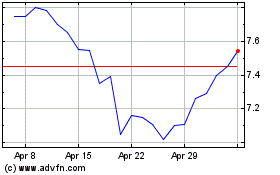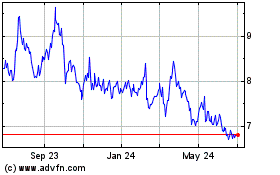By Nick Kostov in Paris and Peter Landers in Tokyo
This article is being republished as part of our daily
reproduction of WSJ.com articles that also appeared in the U.S.
print edition of The Wall Street Journal (November 21, 2018).
As auto-making executive Carlos Ghosn spent a second day in
detention in Japan for alleged financial misconduct, members of the
globe-spanning partnership he leads moved to make sense of his
arrest and fill the void left by his absence.
Japanese prosecutors are focusing on stock-related pay at Nissan
Motor Co., whose chairman is Mr. Ghosn, and whether it was properly
disclosed in financial filings, according to a person familiar with
the matter. Nissan, meanwhile, informed the board of Renault SA,
where Mr. Ghosn serves as both chairman and chief executive, that
it had evidence of potential wrongdoing at a Dutch-based joint
venture between the two auto makers, according to people familiar
with the matter.
Late Tuesday, Renault said it had named a deputy CEO and interim
chairman to temporarily take over Mr. Ghosn's responsibilities at
the French auto maker. Renault said it was seeking evidence from
Nissan of the financial misconduct it and Japanese prosecutors
allege against Mr. Ghosn.
The 64-year-old businessman was arrested in Japan earlier this
week after Nissan told authorities that an internal probe found
that the executive's income allegedly had been underreported in the
company's financial statements.
Representatives and family members of Mr. Ghosn weren't
available to comment.
Nissan shares fell nearly 5.5% on Tuesday, their first day of
trading since news of Mr. Ghosn's arrest. Renault shares have shed
almost 10% in the two trading sessions following the arrest.
Mr. Ghosn, who forged the alliance as a top Renault executive
and later as leader of both auto makers, is credited with turning
it into a successful partnership, a rarity in the auto industry. He
recently stepped down as chief executive of Nissan; in addition to
his roles at Nissan and Renault, he is chairman of Mitsubishi
Motors Corp., another alliance member. He is also chairman and
chief executive of the Dutch venture, which serves as a corporate
bridge for the nearly two-decade operational alliance -- and is now
part of Nissan's internal probe.
Mr. Ghosn's role has been a source of growing tension as
executives at Nissan and Renault look toward the future, including
the long-speculated possibility of a full-blown merger. The Wall
Street Journal reported in May that executives on both sides were
informally exploring such a combination. Nissan's senior Japanese
leadership has strongly opposed the idea. Mr. Ghosn has publicly
said a merger isn't the best option, though people familiar with
the matter told the Journal that privately he was more open to a
deal.
On Monday, Nissan Chief Executive Hiroto Saikawa sent a message
about the findings regarding the Dutch entity to Renault's lead
independent director, Philippe Lagayette, the people familiar with
the matter said. It wasn't clear exactly what Nissan communicated
about its findings.
That entity, Renault-Nissan BV, jointly owned by Renault and
Nissan, doesn't make cars, but instead is intended to coordinate
the broad partnership between the two companies. Its board consists
of executives from both companies, according to Dutch corporate
filings.
The unit owns subsidiaries responsible for such activities as
joint purchasing and information-technology services.
Its expenses, which totaled more than EUR150 million ($171
million) in 2016, include management fees for executives, services
provided to alliance partners and payments to outside consultants,
according to the Dutch filings.
Greg Kelly, a Nissan director who was arrested in Japan along
with Mr. Ghosn, is also lead director of a separate
financial-holding company based in the Netherlands, according to
Dutch corporate filings. The company was formed as a subsidiary of
another Nissan unit in 2010, according to filings. It was intended
for investing in startup companies but was largely dormant for
years, said one person familiar with the matter.
After arresting Mr. Ghosn on Monday, Japanese prosecutors said
that he was suspected of understating his income, resulting in
Nissan's issuing inaccurate financial reports in the five fiscal
years ending March 2015.
Prosecutors said they believed Mr. Ghosn received just shy of
Yen10 billion ($89 million) in income over those years, but the
income reported by Nissan to the Tokyo Stock Exchange totaled about
Yen5 billion.
During those years, Nissan reported that several of its
executives received share-appreciation rights, a form of
compensation similar to stock options that rewards executives when
the company stock price rises above a certain level. However,
Nissan reports showed Mr. Ghosn didn't receive any
share-appreciation rights.
Prosecutors believe that Mr. Ghosn, in fact, did receive such
income and that Nissan failed to report it, according to the person
briefed on the investigation. Such a move, if borne out, would
account for a chunk of the income prosecutors allege wasn't
reported.
Even if those suspicions prove accurate, it remains unclear how
the income came to be underreported in Nissan's financial filings,
or why accountants didn't flag the discrepancy. Nissan has said a
whistleblower triggered its internal probe, and that it shared its
findings with the authorities.
Nissan also accused Mr. Ghosn of improperly filing expenses and
using company assets for his private use. The alleged improprieties
occurred over many years, Nissan said.
Mr. Ghosn, who holds French citizenship, hasn't been formally
charged with any crime. But if he is treated like a typical
Japanese detainee, the auto executive is likely to spend the next
few weeks in a small cell in Tokyo and undergo daily interrogation
by prosecutors without a lawyer present.
Prosecutors must decide this week whether to hold him for up to
an additional 20 days. Such a request is typically granted. During
that period, the suspect isn't entitled to bail.
After a meeting late Tuesday, Renault's board said it had
appointed the firm's No. 2 executive, Thierry Bolloré, to serve as
deputy CEO on a temporary basis and Philippe Lagayette, Renault's
lead independent director, to act as interim chairman.
By deputizing Mr. Bolloré, Renault's board empowered him to
wield Mr. Ghosn's voting rights on the board of Renault-Nissan BV,
according to people familiar with the matter. That move is crucial,
the people said, because it preserves the balance of power that
Renault and Nissan share in the joint venture.
In a memo posted to the company's intranet late Monday, Mr.
Bolloré, who is currently chief operating officer, expressed his
"full support" for his boss, but also said the company's
"governance bodies are playing their full role in defending Groupe
Renault's corporate interest."
--Sam Schechner in Paris and Phred Dvorak in Tokyo contributed
to this article.
Write to Nick Kostov at Nick.Kostov@wsj.com and Peter Landers at
peter.landers@wsj.com
(END) Dow Jones Newswires
November 21, 2018 02:47 ET (07:47 GMT)
Copyright (c) 2018 Dow Jones & Company, Inc.
Nissan Motor (PK) (USOTC:NSANY)
Historical Stock Chart
From Jun 2024 to Jul 2024

Nissan Motor (PK) (USOTC:NSANY)
Historical Stock Chart
From Jul 2023 to Jul 2024
